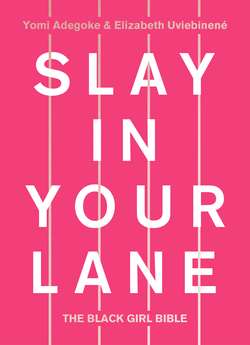Slay In Your Lane: The Black Girl Bible

Реклама. ООО «ЛитРес», ИНН: 7719571260.
Оглавление
Yomi Adegoke. Slay In Your Lane: The Black Girl Bible
Copyright
Dedication
INTERVIEWEES
FOREWORD
‘It’s Always a Race Thing With Her’ ELIZABETH
YOMI
EDUCATION
Lawyer, Doctor, Engineer. ELIZABETH
Black Faces in White Spaces. YOMI
WORK
Work Twice as Hard to Get Half as Good. ELIZABETH
Water Cooler Microaggressions. ELIZABETH
***Flawless. YOMI
GETTING AHEAD
Independent Women. ELIZABETH
When Life Gives You Lemons, Make Lemonade. ELIZABETH
REPRESENTATION
Being Susan Storm. YOMI
Fifty Shades of Beige. YOMI
#RepresentationMatters. YOMI
DATING
Does He Like Black Girls? YOMI
No Scrubs. ELIZABETH
HEALTH
Black Girls Don’t Cry. YOMI
TLC. ELIZABETH
AFTERWORD. YOMI
ELIZABETH
PICTURE SECTION
ENDNOTES. INTRODUCTION
EDUCATION. Lawyer, Doctor, Engineer
Black Faces in White Spaces
WORK. Work Twice as Hard to Get Half as Good
Water Cooler Microaggressions
***Flawless
GETTING AHEAD. Independent Women
When Life Gives You Lemons, Make Lemonade
REPRESENTATION. Being Susan Storm
Fifty Shades of Beige
#RepresentationMatters
DATING. Does He Like Black Girls?
No Scrubs
HEALTH. Black Girls Don’t Cry
TLC
BIBLIOGRAPHY. INTRODUCTION
EDUCATION. Lawyer, Doctor, Engineer
Black Faces in White Spaces
WORK. Work Twice as Hard to Get Half as Good
Water Cooler Microaggressions
***Flawless
GETTING AHEAD. Independent Women
When Life Gives You Lemons, Make Lemonade
REPRESENTATION. Being Susan Storm
Fifty Shades of Beige
#RepresentationMatters
DATING. Does He Like Black Girls?
No Scrubs
HEALTH. Black Girls Don’t Cry
TLC
ACKNOWLEDGEMENTS
ABOUT THE AUTHORS
About the Publisher
Отрывок из книги
For Yem, who taught me to ‘Slay In My Lane’ before I knew what it meant to, and for Yinks, who inspires me to do so daily, and more than she will ever know.
Yomi
.....
The fact that there are more black students at university than any other ethnic group is largely as a result of how we view education. For many of us, as Elizabeth pointed out earlier, education is often posited as the antidote to racism. We believe we can educate ourselves out of inequality with the right qualifications and grades. But while education, especially higher education, can indeed do wonders for social mobility, it is unfortunately the case that inequality is still present on the way up. In order to get into university in the first place, black students must do better than their white peers, and they are still less likely to get into the more prestigious institutions, regardless of their A-level results.36 As Dr Omar Khan, the Director of the Runnymede Trust, says: ‘What message does that send to young people who have heard for decades now that “education, education, education” will ensure their equal opportunities in the labour market?’
Even more alarmingly, after they have jumped through the hoops to reach university, black students will, on average, leave with lower university grades than their white peers. These are students who have proved by their A-levels that they have the ability to thrive in the world’s most elite institutions, but they fall short once they arrive. There has been little research into why this happens, but several of the issues discussed above – a lack of understanding surrounding the inevitable culture shock, multiple microaggressions at the hands of peers and staff – are likely to play a part. In 2010, 67.9 per cent of white students gained a first-class or upper-second-class degree at university compared to only 49.3 per cent of BAME students who entered with the same grades. Black students underperform compared to all other groups,37 and this occurs regardless of the type of university they attend, while 72 per cent of white students who started university with A-levels of BBB in 2014 got a first or 2:1, compared with 53 per cent of black students.38 Furthermore, despite an overall increase of BAME students in higher education,39 they are still less likely to find jobs that match their education level once they leave, or to progress to professorships.40 British ethnic minority graduates are between 5 and 15 per cent less likely to be employed than their white peers – and as if that wasn’t enough of a blow, for ethnic minority female graduates in particular, there are large disparities between their wages and those of their white counterparts. The same study shows that three and a half years after they have left university, the difference in earnings between ethnic minorities – especially women – and their white peers actually increases.
.....